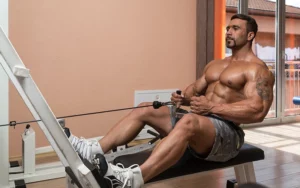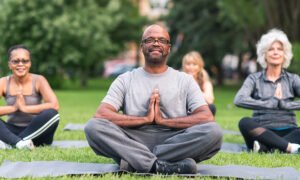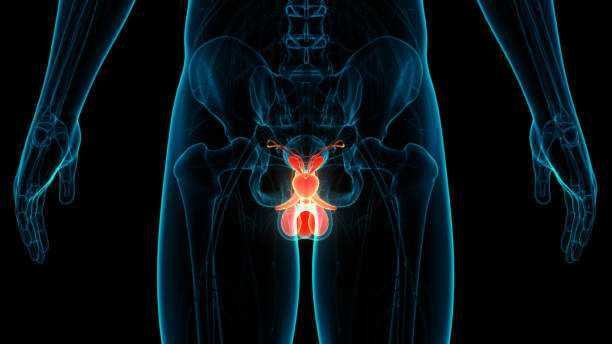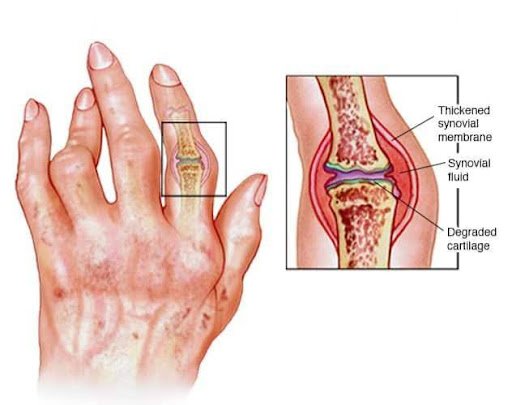Lack of Exercise in Leisure may Increase Death Risk

Lack of exercise in leisure can be as destructive as a poisoned meal!
In the quest for a longer, healthier life, one simple truth emerges – the power of movement.
A recent publication in January 2024 shed light on the profound connection between physical activity and longevity, emphasizing that even small doses of exercise can significantly lower the risk of premature death.
This isn’t just about fitting into your favorite pair of jeans; it’s about embracing a lifestyle that could be the key to a vibrant future.
As we dig deeper into this topic, we’ll explore some recent interesting reports, discover activities that lower mortality risks, understand the impact of a sedentary lifestyle on heart health, delve into socio-cultural factors affecting exercise, address cardiovascular risks in black men, and find practical tips for maintaining a consistent exercise routine.
Are you ready? Let’s fire on!

Latest Reports on the Effect of Leisure Activities on Mortality:
- A 2023 World Health Organization (WHO) study highlighted the direct link between leisure activities and mortality rates, emphasizing the universal impact of physical activity on life expectancy.
- The American Heart Association’s 2024 report stressed the importance of leisure activities in reducing cardiovascular diseases, making a compelling case for integrating exercise into daily routines.
- The 2022 British Journal of Sports Medicine’s meta-analysis synthesized findings, showcasing the significance of diverse physical activities in extending lifespan.
- The Lancet’s Global Burden of Disease study in 2023 underlined how sedentary lifestyles contribute significantly to the global burden of disease, urging the promotion of physical activity for public health.
- The CDC’s 2024 report explored the impact of leisure activities on mental well-being, suggesting dual benefits beyond physical health.
What Activities are Associated with Lower Risks of Death?

Certain activities emerge as champions in the pursuit of a longer life. Engaging in brisk walking, swimming, dancing, yoga, gardening, and weight training has been identified as powerful contributors to lower mortality rates.
The rhythmic dance of jogging and the strategic moves in racquet sports prove particularly impactful, providing a symphony of health benefits.
Lack of Physical Activities and Increased Rate of Heart Disease: Studies Show:

The heart, our life conductor, is profoundly affected by lifestyle choices. Recent studies reveal alarming scenarios that links a sedentary lifestyle to an increased risk of heart disease.
- A Harvard Medical School study highlighted how prolonged sitting elevates the risk of developing heart disease, regardless of other physical activities.
- The Framingham Heart Study revealed a direct link between low physical activity levels and the incidence of coronary heart disease, emphasizing the importance of consistent movement.
- A Mayo Clinic case study identified a sedentary lifestyle as a significant factor in the development of heart disease, especially in those with a family history of cardiovascular issues.
Socio-cultural Factors that Cause People Not to Exercise:

For many, barriers to physical activity extend beyond personal choice. Socio-cultural factors play a pivotal role in shaping exercise patterns, and understanding these dynamics is crucial for fostering a healthier society.
- Socioeconomic Disparities: Limited access to recreational facilities and financial constraints can hinder individuals from engaging in regular physical activity.
- Cultural Perceptions: Deep-rooted cultural beliefs may perceive certain forms of exercise as incompatible with societal norms, restricting participation in activities deemed unconventional.
- Gender Roles: Societal expectations and traditional gender roles can create disparities in exercise opportunities, limiting options for both men and women.
- Urbanization Challenges: Rapid urbanization often leads to reduced open spaces and increased sedentary behaviours due to a lack of infrastructure for physical activities.
- Educational Barriers: Limited awareness and education about the benefits of exercise can contribute to a lack of motivation and understanding among certain populations.
Why Do Black Men Have Higher Cardiovascular Risk?

Despite medical advances, black men face higher cardiovascular risks, raising questions about factors contributing to this health disparity.
1. Genetic Predisposition:
-
- Research suggests that certain genetic factors may increase the susceptibility of black individuals to cardiovascular issues. These genetic predispositions can contribute to a higher likelihood of conditions like hypertension and coronary artery disease.
2. Socio-economic Factors:
-
- Black men, on average, face higher levels of socio-economic disparities. Limited access to healthcare, lower income levels, and reduced educational opportunities can hinder their ability to adopt and maintain a heart-healthy lifestyle. Socioeconomic factors play a significant role in determining the overall cardiovascular health of an individual.
3. Cultural Influences:
-
-
- Cultural practices and dietary habits can impact cardiovascular health. In some African American communities, traditional diets may include foods that are rich in flavour but also high in salt, sugar, and unhealthy fats. These dietary patterns can contribute to conditions such as hypertension and obesity, elevating cardiovascular risk.
-
4. Healthcare Disparities:
-
- Disparities in healthcare access and quality of care can contribute to higher cardiovascular risk. Black men may face challenges in accessing timely and appropriate medical attention, leading to undiagnosed or poorly managed conditions.
5. Psychosocial Stressors:
-
- Black men often experience higher levels of psychosocial stressors, including systemic racism, discrimination, and socioeconomic stress. Chronic stress can contribute to elevated blood pressure, inflammation, and other factors that increase the risk of cardiovascular diseases.

6. Lifestyle Factors:
-
- Lifestyle choices, such as smoking and physical inactivity, play a crucial role in cardiovascular health. Due to various factors, including stress and limited access to recreational facilities, some black men may be more prone to engaging in less healthy lifestyle behaviours, further contributing to cardiovascular risk.
7. Barriers to Healthcare Information:
-
- Limited access to healthcare information and resources can impact preventive measures. Awareness about the importance of regular check-ups, healthy lifestyle choices, and early detection of risk factors may be lower, leading to delayed interventions.
8. Implicit Bias in Healthcare:
-
- Studies indicate that racial and ethnic minorities, including black individuals, may face implicit biases in healthcare settings. These biases can affect the quality of care received, potentially leading to suboptimal management of cardiovascular conditions.
Eight (8) Leisure-time Exercises to Engage to Lower Death Risk:

Embarking on the journey to a longer, healthier life is not a quest reserved for the elite or the fitness enthusiasts. Recent revelations underscore the accessibility of this path – a path paved by the simple yet transformative act of moving our bodies.
Let’s unravel the secrets of activities associated with lower risks of death, transforming the pursuit of longevity into an engaging and attainable narrative.
-
Brisk Walking:
Brisk walking emerges as a steady and reliable thread. It requires no special equipment or exorbitant gym fees; it’s a universal stride that beckons individuals of all ages and fitness levels.
The rhythm of a brisk walk not only elevates the heart rate but also contributes to overall cardiovascular health. Picture a serene stroll in the park or a purposeful walk to the grocery store – each step is a stride towards a longer life.
2. Swimming:
The gentle resistance of water, the rhythmic strokes, and the weightless sensation – swimming offers not just a workout but an immersive experience.
Recent studies affirm its prowess in engaging multiple muscle groups and providing a low-impact yet highly effective cardiovascular workout.
Whether you’re navigating the lanes of a pool or enjoying the natural embrace of open waters, swimming proves to be a dive into lifelong vitality.
3. Dancing:
In the dance of life, there’s a unique and joyous form of exercise – dancing. It’s not just about coordinated steps; it’s about embracing movement as a celebration.
Recent insights reveal that dancing not only contributes to physical health but also enhances mental well-being.
Therefore, whether it’s a salsa class, a spontaneous living room dance party, or a traditional cultural dance, every twirl and sway become a step towards a longer, more vibrant life.

4. Yoga: Balancing Mind, Body, and Longevity

Yoga, the ancient practice of harmonizing mind and body, has found its place in the modern pursuit of longevity.
Recent research emphasizes its role in improving flexibility, building strength, and fostering mindfulness. It’s not just a series of poses; it’s a holistic approach to well-being.
Picture the serenity of a morning yoga session, each stretch and breath contributing to a balanced and extended life.
5. Cycling:
The simple act of pedalling transforms into a powerful journey towards heart health. Recent studies showcase how cycling enhances cardiovascular fitness while being gentle on the joints.
Whether it’s a leisurely ride through the neighbourhood or an adventurous mountain trail, each turn of the pedal becomes a contribution to a heartier and longer life.
6. Weight Training:
Weight training, often associated with bodybuilders, emerges as a surprising ally in the quest for longevity. Recent insights highlight its role in building muscle mass, boosting metabolism, and enhancing overall strength. It’s not about lifting massive weights; it’s about building resilience one rep at a time.
Picture a well-rounded weight training routine, where each lift becomes an investment in a stronger and more enduring future.
7. Hiking:
In the embrace of nature, hiking becomes more than a recreational activity; it becomes a prescription for physical and mental well-being.
Recent studies showcase how hiking not only connects individuals with nature but also promotes physical activity.
Whether it’s a leisurely stroll through a scenic trail or a challenging ascent to a summit, each step becomes a stride towards a longer, healthier life.
8. Playing Racquet Sports:
The swift swings and strategic moves in racquet sports unfold as a dynamic workout with undeniable cardiovascular benefits.
Recent revelations highlight the impact of engaging in activities like tennis or badminton on heart health. It’s not just a game; it’s a vibrant symphony of movement that contributes to a longer and more active life.
How to Maintain a Consistent Leisure-time Exercise Routine for Maximum Health:

Embarking on a journey towards a more active lifestyle requires dedication and strategy. Here are what you must do:
- Set Realistic Goals: Start with achievable milestones to build momentum.
- Find Enjoyable Activities: Choose exercises that bring joy to sustain long-term commitment.
- Establish a Routine: Consistency is key; integrate exercise into your daily schedule.
- Mix It Up: Keep things interesting by incorporating a variety of activities.
- Seek Social Support: Engage in group activities or find a workout buddy for motivation.
Conclusion:
Having unraveled the connection between leisure and health, the message is simple – an active lifestyle safeguards life itself.
Through authentic reports, cultural insights, and practical tips, we hope to inspire a collective shift towards a vibrant and health-conscious society.
Frequently Asked Questions
- How much exercise is necessary to lower the risk of death?
Even small doses of exercise can significantly lower the risk of premature death. Aim for at least 150 minutes of moderate-intensity exercise per week.
2. Can cultural factors influence exercise habits in African communities?
Certainly. Cultural beliefs, socioeconomic factors, and urbanization challenges can significantly impact exercise patterns in African communities.
3. Why focus on black men’s cardiovascular risks specifically?
Addressing health disparities is crucial, and understanding the factors contributing to higher cardiovascular risks in black men can inform targeted interventions and healthcare strategies.
Acknowledgments:
Our commitment at Enthusiast Express to promoting health and well-being remains relentless. Through the dissemination of timely and qualitative information, we play a crucial role in empowering individuals, especially adult men in Africa, to embrace a lifestyle that ensures maximum health and vitality. Together, we stride towards a healthier, happier future.

Related Post
Caffeine Consumption: Sources you’re not aware of, Plus some Side Effects
February 24, 2024
Health & Medicals
Picture this: it’s Monday morning, you reach for your favourite cup of coffee to kickstart the day…
Read More

Eat Smart, Train Strong: Your Exercise Nutrition Guide
February 6, 2024
Health & Medicals
Hey there, fitness enthusiast! Have you ever wondered why your workouts feel like a breeze one day…
Read More

Top (Proven) Natural Health & Nutrition Tips For Healthy Living
January 29, 2024
Health & Medicals
Do you ever find yourself in the maze of health advice, wondering where to start? Well, you’re in…
Read More

THE IMPACT OF DIET ON SEXUAL PERFORMANCE
January 3, 2024
Health & Medicals
Curious about the real impact your diet might have on your sexual performance? Well, buckle up…
Read More
Also, for more insights into men’s health and well-being, check out these articles on our page.
RHEUMATOID ARTHRITIS
January 16, 2024
Health & Medicals
Buckle up for a chat on Rheumatoid Arthritis—a comprehensive understanding of its operation. Imagine…
Read More

Erectile dysfunction: Viagra and Other Oral Medications
January 16, 2024
Health & Medicals
If you’ve been seeking a solution, a permanent one, to curing ED, and you’re looking for a ‘Yea or…
Read More

Erectile Dysfunction: Advanced and Future Treatments.
January 10, 2024
Health & Medicals
Several studies have gone into discovering a lasting solution to this regnant force called ED. While…
Read More

Erectile Dysfunction Treatment: Natural Supplements Vs. Medical Treatments
January 5, 2024
Health & Medicals
If you’re in between confusing thoughts about which one to choose between Medical solutions and…
Read More

Enlarged Prostate: What are the Symptoms and Treatment Options?
November 21, 2023
Health & Medicals
Enlarged Prostate: How does this happen? How can I Avoid or Treat it? Image Source: Freepik…
Read More

Get rid of Arthritis Pain permanently: 5 Natural Cures
November 11, 2023
Health & Medicals
Get rid of Arthritis Pain permanently: 5 Natural Cures Navigating Arthritis for African Men OUTLINE…
Read More





Nice blog here Also your site loads up fast What host are you using Can I get your affiliate link to your host I wish my web site loaded up as quickly as yours lol